ESCAPE
TO





CHARLIE CONCHIE
VODAFONE’s new chief Margherita Della Valle will be looking to lay out a convincing vision for the firm tomorrow as she updates the City with its full year results for the first time in the top job.

Della Valle (pictured), the former finance chief, has been tasked with breathing life into the FTSE 100 laggard after a 58 per cent collapse in its share price over the past five years. Analysts are expecting the firm to post pre-tax profits of €4.8bn (£4.2bn), down from just over €5bn last year.
Hargreaves Lansdown said it was “not looking too hopeful” that the fourth quarter will offer a major improvement on the previous three quarters.

CHRIS DORRELL AND CHARLIE CONCHIE
AS BANKS come under fire for offering “measly” rates to savers, new figures reveal many are leaving hundreds of billions of pounds lying idle in zero-interest accounts.
Some £233bn is being held in zerointerest accounts, according to Bank of England Data analysed by asset management firm Bowmore.
This is up from the total held in such accounts back in November 2021 at the beginning of the Bank of England’s rate-
hiking cycle, which last week raised interest rates again to 4.5 per cent.
The figures will likely add more weight to calls that banks should be doing more to make sure customers are getting a good deal.
The influential Treasury Select Committee recently expanded its probe into the low savings rates currently on offer beyond the four largest retail banks to include Nationwide, Santander, TSB and Virgin Money.

Keeping savings in a zero-interest account means the value will be eroded by
inflation, which remains above 10 per cent despite the Bank’s efforts to bring it down.
A Lloyds Banking Group spokesperson told City A.M. that customers were “proactively moving their money as their needs change”, while Barclays, HSBC and Natwest all said they offer competitive rates to savers.

“We would always encourage people to shop around for the product and interest rate that is suited to their need,” UK Finance, which represents Britain’s banking industry, told City A.M. However, the Financial Conduct Authority
has argued that the incoming Consumer Duty will force firms to demonstrate they are not exploiting customer inertia.
“Savers have got used to a decade and a half where interest rates were effectively zero and there was little point shopping around for a better deal on your savings. Those days are long gone,” Charles Incledon, client director at Bowmore Asset Management, said.
“People need to be aware that savings in a zero-interest account are being eaten away at an alarming rate at the moment,” he added.

“It will be interesting to hear further details from the new CEO on her vision for the business,” Matt Britzman, an equity analyst at Hargreaves Lansdown said. “Price hikes throughout Europe are already underway, which should help limit some of the impacts of higher costs.”
“There could be portfolio changes on the horizon, not least of which may centre around the ongoing talks to merge Vodafone’s UK business with Three UK,” he added.

CHARLIE CONCHIE
A LOBBY group has today warned of the “startling rise in the cost of accepting cards” for small businesses after the European chief of Mastercard defended the fees it levies on merchants over the weekend.
Interchange fees, which are
charged to merchants and paid to the card issuing bank and payment network, have climbed sharply in recent years and squeezed merchants.
The price hikes have drawn the ire of business bodies who have argued it amounts to a tax on card payments.
But the European president of

Mastercard, Mark Barnett, this weekend defended the current fee structure.
“We believe interchange is the right mechanism for everybody, sharing the costs and benefits of the payment system,” he told the Financial Times. “We think it represents incredibly good value.”
Start-up lobby group Coadec –

which helped launch the ‘Axe the Card Tax’ campaign last year calling for regulators to step into the market and reduce fees –criticised his comments.
“Coadec is part of the Axe the Card Tax campaign because of the startling rise in the cost of accepting cards,” Luke Kosky, fintech policy lead at Coadec, told City A.M.
Coadec’s analysis suggests card processing fees have risen 600 per cent over the past eight years. “The government has not yet worked out if the current cap levels are right for the UK where 90 per cent of retail sales are on cards,” Kosky said. The Payment Systems Regulator is conducting a market review of the fees paid to card payment networks.
LIKE a solid lower-league football manager, business secretary Kemi Badenoch recognises that the most important thing in life is talent. In her interview with us today, she says the capital will remain at the top table of global finance on the grounds that London will continue to be a magnet for the world’s best and brightest. Let’s hope she’s right –but her government shouldn’t be complacent. The last fortnight
has seen a barrage of data on the cost of housing here; at the bottom, middle and top end, London is simply becoming unaffordable for far too many. This newspaper, to take one business, has lost smart, bright, intelligent youngsters who have
decided that the sensible financial decision is to work, and live, elsewhere. The knock-on effect of that is obvious. What could change this? Building some houses would help. Reducing the cost of train fares from outside of London, too, would be an idea –the Germans are currently enjoying a (heavily subsidised) €49 monthly season ticket, which is about the same cost as a peaktime return to Godalming.
THROUGH THE DIRT Competitors in the annual Maldon Mud Race got down and dirty over the weekend as they made their way across the bed of the River

CHARLIE CONCHIE
BANKS are expected to ramp up their lending this year as the UK economy dodges the gloomiest recession predictions and the housing markets shows signs of some revival, according to a panel of top economists.
Total UK bank loans are now expected to rise 1.2 per cent this year, a net increase of £29bn, upgraded from a 0.1 per cent fall forecast in February, according to the EY ITEM Club UK Bank Lending Forecast.
Falling inflation, lower-than-expected energy bills and a resilient
jobs market mean UK GDP is expected to swell by 0.2 per cent in 2023 rather than contracting, driving an increase in consumer and business borrowing.
Net mortgage lending is now expected to grow 1.2 per cent in 2023, up from 0.4 per cent in the February Forecast, according to the EY forecast.

Anna Anthony, UK financial services managing partner at EY, said the UK is “still on the path to economic recovery” but we are “in a more optimistic place than we were a few months ago”.
“The recession that many thought
was inevitable is now likely to be avoided and energy prices have fallen, boosting consumer and business sentiment,” she said.
“Despite recent volatility in the global banking sector, the EY ITEM Club has been able to upgrade its growth forecasts for UK bank lending this year, which is positive news.”
The crisis rippling through the US banking sector has also so far had “limited impact on the UK’s highly capitalised lenders”, EY’s economists added, though they said risks to the downside are “present within the forecast”.
Of course, in a sense, that housing remains so costly is a sign of the capital’s resilience. It was easy enough to buy central London property in the 1970s, but few would like to revisit the time of rubbish bags left uncollected in Leicester Square. But we must start thinking about the future –the next generation –and ensuring that they can move to a prosperous, buzzy city, and build the businesses of the future.
£ BADENOCH BACKS THE CITY: P12
THE TELEGRAPH
BOE TO WATER DOWN RULES FOR LENDERS TO BOOST BRITAIN’S COMPETITIVENESS
The Bank of England is preparing to water down changes to its post-crisis rulebook after lenders warned plans to raise bank buffers will strangle small businesses and harm the economy.
THE GUARDIAN UK MINISTERS URGED TO INTERVENE IF AUSTRALIAN BANK TAKES 100 PER CENT OF GAS BUSINESS
Ministers have been urged to intervene if Macquarie pushes the button on a mooted £3bn deal to take full control of a vital part of the UK’s gas grid.
FOR ERDOGAN
Turkey’s opposition alliance has accused state media of “deceiving” the public with early results of Sunday’s election, underscoring the intense battle between Erdogan and Kılıçdaroğlu.
GUY TAYLOR
THE INSOLVENCY Service last year launched 36 per cent more investigations into the alleged misconduct of directors of insolvent companies than the year before, data from international law firm RPC shows.
According to RPC, the number of investigations increased from an average of 142 per month between April 2021 and March 2022 to 193 between 1 April 2022 and December 31 2022 while corporate abuse cases more than doubled.
The findings come as high interest rates and a stagnant economy have battered firms, contributing to a record number of insolvencies in March.
James Wickes, partner in RPC’s professional and financial risks team, said: “With insolvencies on the rise, we can expect to see more instances of fraud and other types of misconduct coming to light.
“Post-insolvency actions against directors has historically been one of the main sources of claims on director and officers policies,” he added.

INVESTMENT firm M&G has called on its managers to get back in the office for three days a week in a bid to boost the morale and development of its junior staff – but they won’t be allowed to simply swan in on Tuesdays, Wednesdays and Thursdays.
The FTSE 100 investor has joined a wave of firms calling on staff to get back into the City, as companies look to reset widespread working from home brought on by the pandemic. London-headquartered M&G has told its bosses to spend three days a week at the office to reap “the value of spending time together”. Junior staff at the firm also want more of the “leadership team in the office than is currently the case”, M&G’s chief Andrea Rossi and his top team told managers in an email, reported by The Sunday Times. Managers at the investment firm have
been asked to come into the office for three days a week on a rotating basis, effectively ruling out the proliferating ‘TWaTs’ (Tuesdays, Wednesdays and Thursdays) routine, which has left the City deserted on Mondays and Fridays.

“Our aim is to build a team and an environment that helps everyone at M&G be at their best. A big part of that is about spending time with colleagues, clients, customers and stakeholders,” an M&G spokesperson told City A.M.
The firm first informed staff of the change last month and is currently going through a staggered introduction of the policy over the next two months to allow “people to make any necessary arrangements”.
“That’s the next step in unlocking the benefits of a simpler operating model and making M&G a faster, more agile and collaborative place to work that’s easy for our clients to do business with,” the spokesperson said.


 DOMINIC MCGRATH
DOMINIC MCGRATH
RAIL minister Huw Merriman has defended the government’s stance on strikes, months after admitting the government has lost more money due to the impact of rail strikes than it would have cost to settle the disputes months ago.
Merriman, in an interview with The





LUKE THOMAS
JD WETHERSPOON chief Tim Martin (pictured) has called for firms and the government to do more to stop people retiring early, demanding “we should get the b******s back to work.” UK labour shortages have been exacerbated by Britons leaving the workforce before the state pension age of 66, increasing the number of economically inactive in the country. Speaking to The Mail on Sunday, the 68-year-old boss of the pub chain it was up to employers to entice those who left jobs during the pandemic back to work.
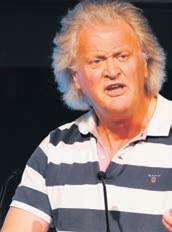
“It is up to businesses to make it attractive to work, maybe part time, which is what a lot of the oldies do in our business,” he said.
House magazine, said while he “would not deny” there has been financial damage caused by strike action, the government stance was the right one.
“If you settle at a much larger figure, then that creates a precedent across the public sector as a whole,” Merriman warned.
“That impacts inflation, that damages the economy,” he said.
“We are built to work, and it suits me,” Martin said. “I think me and Warren Buffett should launch a campaign to say life is sweeter if you go out to work when everyone else is retired.” PA


CHARLIE
IMPERIAL Brands will be looking to convince investors its vaping and so-called ‘next generation products’ can light up profits in the long-term as it updates the City with its first half results on Tuesday.
Like its competitors, the tobacco giant is grappling with a downturn in traditional tobacco sales and a pivot from consumers to vaping.
The chief of the FTSE 100 firm, Stefan Bomhard, struck out on a five year plan in 2021 to try and ensure its long-term profits don’t go up in smoke, with a re-set in its ‘next generation products’ (NGPs) and a focus on five key markets for tobacco central to the plans.
Analysts are pricing in a further 5.6 per cent drop in traditional tobacco product volumes this year to 209m, including the
loss of 7bn stick equivalents after the withdrawal from Russia, meaning analysts will be keenly watching tomorrow’s numbers as a benchmark for the months ahead.
“Even those investors who do not run strict ESG screens must continue to ponder the long-term future for smoking in the wake of a respiratory virus pandemic; the ongoing regulatory pushback against the industry; and Imperial’s own efforts to adapt to the possibility of a brave new world by developing its next-generation products,” said Russ Mould and Danni Hewson, AJ Bell analysts in a note.
Total pre-tax profits for the full year to September 2023 are expected to come in at £3.56bn, according to analysts’s consensus figures, with NGPs expected to contribute £247m of total £8.13bn across its products.
WAGAMAMA owner The Restaurant Group (TRG) has come under renewed pressure from investors ahead of its AGM next week, with Coltrane Asset Management calling for change at the company after building a three per cent stake in the firm.

The New York-based activist investor told The Sunday Times it backed proposals by another investor, Oasis Management, for the group to sell off its Brunning and Price pubs and airport concessions business.
“We think there is significant value to be unlocked in the company, and that the board and management need to be open to all strategic options,” Coltrane said.
The comments will put further pressure on CEO Andy Hornby, who has come under increasing criticism from stakeholders in recent months over the firm’s poor performance.




LUXURY retailer Burberry could prove its buyers have been sheltered from cost-of-living pressures when it unveils its full-year financial results on Thursday.
The historic British brand, which has benefitted from the reopening of the Chinese economy this year, is expected to show a jump in profits for the year ending in March.
The forecast comes despite a number of retailers flagging a downturn in consumer demand as cost pressures squeeze budgets.
Burberry, known for its trench
coats and checked cashmere scarves, took a hit from lockdown restrictions in mainland China, its biggest market.
The world’s second largest economy only began significantly easing its strict zero-Covid policy at the end of last year, to the relief of investors and global businesses.
Sales declined by nearly a quarter in the region in its third financial quarter, dragging down its total sales figure which was otherwise boosted by strong demand in Europe, the Middle East and Africa.
But investors will be hoping the return of shoppers in Asia will
Dates: Saturday, 13 May & 03 June 2023

Spaces
bolster revenues in its final quarter.
Burberry, along with other designer brands like Hermes and LVMH, have proved wealthy shoppers have not been cutting back on big-ticket purchases.
Susannah Streeter, head of money and markets at Hargreaves Lansdown, said Burberry’s customers have “wealthy layers of protection” from inflation, with the group reporting strong sales in bags and costs in its last update.
The company is expected to report group revenues of £3.bn for the full year, up from £2.8bn the previous year, according to analysts.























































































































































































FERRARI has said it plans to keep building normal car engines despite regulatory pressure to boost electric car production.
The Italian car manufacturer plans to keep building internal combustion engines (ICEs) well into the 2030s, while also scaling up its production of new electric vehicles.
In an interview with the BBC, Ferrari chief executive officer Benedetto Vigna said it would be


JESSICA FRANK-KEYES
EMERGING AI technologies will have a bigger impact on the global economy than the Industrial Revolution, a leading expert has predicted.
Emad Mostaque, the founder of Stability AI, the maker of a free AI-image generating tool Stable Diffusion, has suggested artificial intelligence (AI) will be bigger than Google and Facebook within a decade.

Speaking to the BBC’s yesterday, Mostaque said he agreed with the UK’s former chief scientific advisor Sir Patrick Vallance about the effect of AI.
“By next year this technology is going to be everything,” he said. “It’s moving the nature of society.”
“In ten years time, [AI] will be bigger than Google or Facebook. This is why I think Vallance is right; it’s bigger than the Industrial Revolution,” he said. He backed growing calls for AI regulations, calling for international standards to be implemented on how AI should be used in society.
Warning on the dangers of AI, he said: “If we have agents that we can’t
control and they achieve a level of automation… the worst case scenario is that it proliferates and basically controls humanity.”
“We have to be careful and move fast,” he said. “I think this will have a bigger economic impact than the pandemic and it’s up to us to decide which direction.”
Asked about the risk posed to people’s jobs, he said: “I think it is serious and this is a question that’s occurred with every single technologi-
cal advancement.
“[But] you can take amazing photos on your Google Pixel or your iPhone but there’s still more photographers employed than ever. What happens is that a lot of tasks become easier. AI lowers the bar so that we can become more productive,” he said.
Citing Goldman Sachs research, he added that integrating AI into more areas of the economy “could add six to seven per cent to GDP”.
“arrogant” to tell customers what to buy, despite efforts by governments worldwide to reduce the production of ICEs.
“I don’t want to be arrogant and impose a choice on our client,” he said. “It is the client who must choose if they want an ICE, a hybrid or an electric car.”
Earlier this year, the EU passed a landmark law, which banned the sale of new ICE cars in the bloc after 2035.
But Germany, which is home to many car makers, recently won a

EASYJET is anticipating higher profit when it reports its half year results on Thursday, as the airline benefits from the return of summer holiday bookings and higher ticket prices.
The low-cost carrier said it expects to exceed full year profit expectations of £260m, with half year losses forecast to shrink to £400m.
Group revenue is predicted to hit £2.69bn, but costs will remain high at £3.1bn as fuel prices continue to bite.
In its quarterly results this month,
LUKE THOMAS
BRITISH STEEL has once again delayed publication of its accounts for 2021 amid growing concern for the company and wider UK steel industry.
The Chinese-owned steelmaker, based in Scunthorpe, has twice delayed filing its accounts with
Companies House. Originally meant for filing at the back end of 2022, delays were caused by a fee disagreement with auditor Mazars.

British Steel now says it plans to file accounts “over the summer”.
In February, the firm announced the planned closure of its coking ovens, threatening 300 jobs. This came on the back of its Chinese
British Airways owner IAG reported its first quarter of profit since Covid-19.
Easyjet’s last quarterly results saw its share price jump to its highest level since June after it raised its full year profit guidance and reported a 35 per cent rise in passengers.

“The important figure will be forward bookings,” Sophie Lund-Yates, lead equity analyst at Hargreaves Lansdown. “IAG said about 80 per cent of its available summer capacity had been sold and we’re cautiously optimistic that Easyjet will at least match this.”
controversial exemption that enabled the continued manufacturing of the engines that run on e-fuels –synthetic fuels manufactured using captured carbon and hydrogen.
Vigna welcomed the e-fuel ‘loophole, at the time, telling a Reuters event in March that “the good news for us as a company… is that on top of electric cars, we’ll also be able to go on with our internal combustion engines ones”.
Ferrari plans to release its first fully electric supercar model in 2025.
LUKE THOMAS
THE BOARD of housebuilding company Vistry Group is gearing up for confrontation at its AGM on Thursday, as activist investors prepare to challenge the firm over plans for enhanced executive bonuses.
A number of proxy advisory firms, including ISS and Glass Lewis are advising shareholders to vote down Vistry’s remuneration report at Thursday’s AGM.
The AGM votes on executive pay will be advisory rather than binding.
Another group of Vistry’s shareholders, led by activist Inclusive Capital, had in March proposed plans to implement a bonus scheme tied to share price, which could see chief executive Greg Fitzgerald’s bonus reach £60 million if Vistry’s share price hits £18 within three years, around 150 per cent above its current level. This was rejected by Vistry’s renumeration committee, and the board responded by proposing a capped bonus scheme instead.
The FTSE 250 business became one of the UK’s largest housebuilders after acquiring Countryside for £1.27bn last November.
The business posted a pre-tax profit of £248m and turnover of £2.73bn in the year to 31 December 2022.
A spokesperson for Vistry declined to comment.
owner, Jingye, asking for government financial support in October last year.
British Steel declined to comment.
Concerns over British Steel’s finances come days after rival Tata Steel announced “material uncertainty” over the future of its UK business, which is also expected to receive millions of pounds in government support in the future.



Cameron House, a five-star resort nestled on the bonnie banks of Loch Lomond, provides a memorable and unique venue to hold the most successful of meetings, events and away days.








Sign up to hear from Cameron House about exciting offers, incentives and events to be in with a chance of winning an unrivalled Scottish escape for two.

Includes a night in one of our stunning suites, Champagne cruise on Loch Lomond and dinner in highly-acclaimed restaurant Tamburrini & Wishart.
ENTER NOW
See website for terms & conditions








BIG Tech suffered painful declines in 2022 with sky-high inflation and central banks scrambling to keep a lid on rising prices. Now with US inflation easing, and the Fed at or close to the peak of the rate-hiking cycle, anticipation of shifting monetary policy dynamics have seen investors pile back into the tech sector. Some stocks have enjoyed impressive gains year-todate with Meta, Tesla and Apple up over 85 per cent, 55 per cent and 35 per cent respectively. The recent buzz around AI has caught the eye of the investors searching for ways to get exposure to this burgeoning theme. This year Microsoft invested billions into ChatGPT, also helping turn attention to tech. On top of that, after years of expansion, tech companies have been cutting costs by slashing workforces to combat the challenges of inflation, weak ad revenues and slow growth. Meta’s CEO Mark Zuckerberg said this is the ‘year of efficiency’.
Fundamental investors would argue that a lot of the gains may
already be priced in. Piling in after a big rally is not often deemed the best strategy. Instead, they seek underappreciated stocks with attractive price tags and the potential for upside.


The counter argument is that percentage increases from the lows are more flattering than percentage falls from the highs and many stocks remain sharply below their recent Covid-era tech boom highs with arguably more room to run.
The underlying US macroeconomic outlook, which is correlated with growth sectors like tech, is murky with analysts divided over whether the US will tip into recession or not. On the one hand, inflation is stuck above target and the backdrop of the banking sector turmoil could have negative reverberations. On the other hand, the trajectory for US inflation is encouraging and the jobs market remains resilient. Any signs of a rosier economic outlook could help tech enjoy a pick-up in consumer demand and stronger ad revenues ahead.


Luxury goods giant Richemont reported record full-year sales up 19 per cent with revenues in its allimportant jewellery division up 16 per cent. Annual profit from continuing operations soared 60 per cent. The group behind brands like Cartier and Van Cleef & Arpels has been benefitting from the release of pent-up demand from China after its anti-Covid lockdown restrictions were removed as well as the resilience of high-end consumers amid the cost of living crisis. However, chairman Johann Rupert warned demand has been weakening in the US since November.

£ Analysts at Citi have changed their bearish tune on the pound. Having previously forecast that GBPUSD would fall to parity, A Citi analyst said ‘we have been wrong, plain, and simple’. The team now expects sterling to rise towards $1.30 by early next year as ‘activity has proven far more resilient’. However, after the pound hit a oneyear high, Deutsche Bank analysts were less cheery, saying ‘having been bullish on the pound since the start of the year, we no longer think the pound presents attractive riskreward in the short term’.





£ Tesco, Aldi, and Lidl followed Sainsbury’s by cutting bread and butter prices. Sainsbury’s announced plans to reduce both items by 10p with the other supermarkets matching these price drops the following day. Critics argue falling wholesale food prices haven’t translated into lower consumer prices fast enough. Marmite maker Unilever’s CEO Alan Jope said last month ‘we are not profiteering in any form’, adding ‘we are very conscious that the consumer is hurting and that’s why we are not passing through the full price increases.’









Excited to announce that I’ve hired a new CEO for X/Twitter




After a challenging period since taking over Twitter, Elon Musk will step down as CEO within weeks
It is easy to be enticed by the celebrity guests on The ii Family Money Show podcast such as Richard Curtis, Deborah Meaden and Rachel Riley, but the main draw for me is that it gets people talking about investing. It’s generally still an awkward subject for many but told through the lives and experiences of famous faces makes it much more accessible. Reassuringly, handling finances hasn’t come easy for some such as Alastair Campbell who leaves it to his partner Fiona to organise. This week’s episode features Nick Leeson, the original rogue trader who caused the collapse of Barings Bank in 1995.


Where the City’s movers and shakers get a few things off their chest. Today, it’s Interactive Investor’s Victoria Scholar
JESSICA FRANK-KEYES
NET ZERO tsar Chris Skidmore has said he “will be voting against the government” on amendments to a landmark piece of energy legislation, but warned that climate change policy can not be allowed to become “the home of the left”.
Former energy minister Skidmore –who led a key review of the UK’s net zero policy, which criticised the government for inconsistent policies and a lack of commitment to meeting emissions targets –said he would “probably be voting in the same lobby as Labour” on several additions or changes to the Energy Bill.
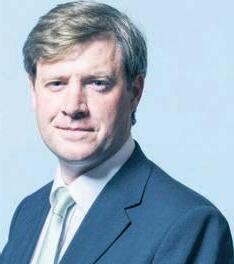
The bill seeks to unlock low-carbon tech investment and bolster domestic energy production.
FORMER competition watchdog chairman Lord Andrew Tyrie has thrown his hat into the ring to head up energy regulator Ofgem, Sky News first reported. Current chair Professor Martin Cave is due to step down in October.
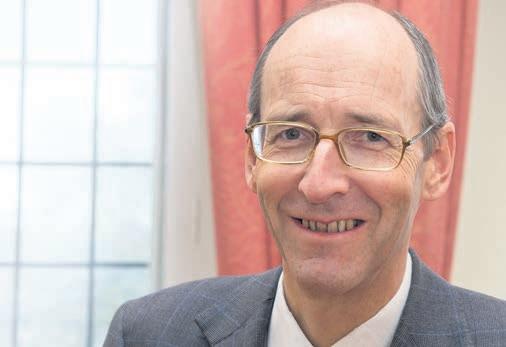

 LUKE THOMAS
LUKE THOMAS
MPs debated the bill for a second time after changes were forced on the government by the House of Lords, including a ban on new coal mines.
The MP told City A.M.: “There are other amendments I’ll be making to the bill because I see this as my one last chance to influence policy.”
Despite his willingness to challenge his own party, Skidmore insisted it was important for the Conservative party to lead on climate change issues.
“I’m a centre right politician and I believe in the power of markets… to succeed in delivering net zero we need to create new net zero markets,” he said. “We can’t allow climate change policy to be totally the home of the left or the centre left.”
But he “cares more about conserving the environment than Conservatism”, he admits.
JESSICA FRANK-KEYES
BRITAIN’s electricity network needs tens of billions of pounds of investment to hit net zero goals, National Grid boss John Pettigrew has warned. The chief executive said the grid required significant cash but investment would lower bills.
Pettigrew told the Sunday Times:
“There’s a real opportunity here… infrastructure investment over time will reduce the UK’s exposure to world gas prices and reduce energy prices, as well as create jobs and enhance GDP.
Pettigrew said the transmission network needed its biggest revamp since its launch in 1935 and waned there was “no time to lose”.

THE UK’s flagship state pension scheme says it has “no current plans” to invest in nuclear infrastructure such as Sizewell C, marking a major setback for the government’s mission to grow the country’s nuclear power output.
Following a change to its energy policy last year, there had been hopes from inside the government that the National Employment Savings Trust (Nest), which manages over £27bn in assets, may revise its approach to investments in nuclear projects.
Nest, however, said it has no direct investments in nuclear at present and told City A.M. there are “no current plans” for this to change. “Nuclear energy is within our investible universe”, a Nest spokesman added, “but at this moment in time there are no particular plans for investment in nuclear infrastructure.”
In response to the statement, first reported by The Sunday Times, the government said it was confident it would be able to secure the investment needed going forward.

ENERGY bills will finally fall this summer after nearly 18 months of sustained hikes, softening a painful cost of living squeeze for millions of Brits.
This year’s drop in wholesale gas prices on the spot market, thanks to Europe’s successful scramble for supplies last winter and China’s flagging economic growth, will soon be reflected in the longterm hedging arrangements energy firms make for customers.
Ofgem is now expected to slash the price cap – which sets the maximum charge for average use – by as much as 50 per cent for July, when the regulator meets next month to announce the latest quarterly update.

Such developments raise the prospect of increasingly competitive deals from energy suppliers as the market returns to a semblance of normalcy, with customers finally able to have some real autonomy over their energy deals through fresh tariffs.
Super forecaster Cornwall Insight estimates the price cap will fall from its current level of £3,280 per year to £2,062

per year in July, before settling at around £2,100 into the new year.
These numbers are way down on the £4,279 per year price cap peak in January and should reduce the pressure on customers.
Nevertheless, energy bills will still be expensive compared to pre-crisis levels, tracking at around double the £1,000£1,200 per year costs prior to Russia’s invasion of Ukraine, the collapse of dozens of British suppliers and the pandemic. Meanwhile, the subsidised rates in Chancellor Jeremy Hunt’s slimmed down household support package will be above the price cap threshold – making its level of protection effectively meaningless unless there’s a price spike.
With support set to be pared back and the price cap still double pre-crisis levels, Citizens Advice previously called on the government to support up to 12m people on the lowest incomes with a lump sum, dictated by income and energy use.
This concept of a social tariff has also been backed by suppliers such as EON and Good Energy, while British Gas owner
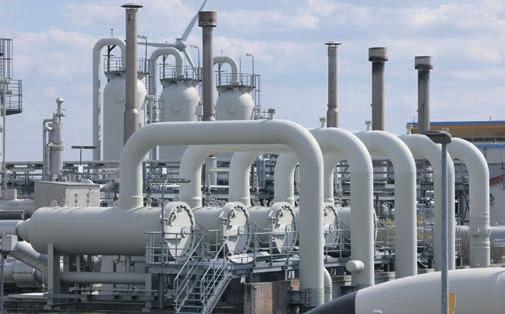
THE G7 and EU will ban the restart of Russian gas pipelines on routes where Moscow has previously cut supplies such as to Poland and Germany, according to sources cited by the Financial Times.
Centrica also lent its support to the idea last week.
Ofgem has also confirmed it is reviewing the prospect of a social tariff – raising the potential for an industry consultation. The appeal of such a tariff makes sense, as a one-off payment to vulnerable customers could be cheaper than an extended universal support package, while also being more effective by being more targeted to people in need.
It would offer more support than the benefit system with universal credit and the warm home discount providing relief to a comparatively tiny number of people compared to the numbers that can still be exposed by a doubling of their energy bills.
In terms of logistics, Citizens Advice has suggested HMRC combines its real-time data on household incomes with energy supplier data on how much electricity and gas each household uses. However, this seems to be a simplistic understanding of a vulnerable customer.
After all, vulnerability is not just financial, it also includes customers with health issues and disabilities – making too much
of a focus on income a limiting factor for support.
Vulnerability can also be transient with customers being bereaved, bankrupt or ill for a certain period of time before later recovering – which is very hard to keep track of through data.
All of this could lead to painful edge cases where people who are clearly in need of support miss out.
There is also the question over whether a social tariff is sustainable – considering the potential long-term duration of higher energy bills.
Electricity prices are on course to remain elevated over the coming decade, according to Cornwall Insight, and the reality is that in a gas-driven crisis, shifting consumers away from gas is the boldest step to easing their energy bills.
To do this, the government’s focus should be on reviving onshore wind, ramping up offshore wind and massively expanding solar power so that green energy dominates our energy hub.
There also needs to be incentives around using less energy.
This could be achieved through more targeted funding for energy efficiency, such as heat pumps and insulation – rather than potential years of payouts.
As the UK emerges into a post-energy crisis marketplace, the government has tough decisions to make, and it is possible higher energy bills will simply be a feature of everyone’s lives until the shift from gas to clean, cheaper renewable energy is complete.
What can we do to improve energy security? Email energy editor Nicholas Earl at nicholas.earl@cityam.com

UK households could spend nearly £6,000 on imported gas by 2035
AUGUST GRAHAM
BRITISH homes will send an average of £5,700 abroad to foreign gas producers to heat their homes and water and cook food by the middle of the next decade, new analysis suggests.
The average home could be buying foreign gas worth around £500 a year by 2035, unless efforts are made to
reduce the UK’s dependency on gas.
The Energy and Climate Change Intelligence Unit (ECIU) said it would not be possible to avoid this by producing more gas domestically, as the UK’s North Sea reserves are dwindling. Instead, Britain will need to speed up the deployment of renewable power, insulate homes and install heat pumps.
“You can’t squeeze much more out of the North Sea... it’s simply running out of gas,” said Dr Simon CranMcGreehin, head of analysis at ECIU. A department for energy security spokesperson said: “This analysis fails to take into account the plans we have in place for powering up Britain, including significant investment in new renewable and nuclear projects.”

MORE than 1,500 UK troops will train alongside thousands of personnel from Nato members as part of a major exercise in Estonia, the Ministry of Defence said.
Named Exercise Spring Storm, it is the largest annual military exercise involving the UK-led Nato enhanced forward presence battlegroup.
Around 14,000 military personnel are set to take part from 11 Nato countries, with the UK marking the
first time it has conducted a brigadesized deployment to Estonia.
The exercise will see ground troops tested on battlefield scenarios, including trench assaults, reconnaissance missions and light infantry tactics.
Defence secretary Ben Wallace said: “Hundreds of UK troops from across our armed forces will again train with personnel from 11 Nato nations, demonstrating the strength of our interoperability with partner nations and our combined commitment to
TRADE secretary Kemi Badenoch (pictured) has pledged her government “gets the City” as she launches trade deal talks with Switzerland.

Speaking exclusively to City A.M., the business and trade secretary said the free trade deal’s (FTA) “potential is limitless” as she hopes to unlock investment in tech, digital and data.
The former Tory leadership contender will launch talks for a services-focused deal with her Swiss counterpart Guy Parmelin in Bern today.
Negotiators will aim to update the 1970s EU-Swiss deal to reflect the modern world in which more than two thirds of UK service exports are delivered electronically.
It is hoped the deal will lower tariffs on UK exports to Switzerland, a change which could save British businesses near £7.4m a year, according to the department of business and trade.
Badenoch will also visit the SIX Swiss Exchange and meet with female business leaders during her stay in Bern.
Badenoch refused to give a deadline for the FTA taking effect but insisted “businesses should know we’re working at pace”.
Speaking on the UK’s competitiveness as a destination to invest in, Badenoch reiterated the Conservatives’ commitment to business.
“Pretty much my entire professional career was in financial services operations. We understand it. We get it. We’ve come from that world.
“If they want a government that gets the City, there’s no one better than the people who are in government right now to do that,” she said.
Easing the investment environment and looking at corporation tax rates to attract more businesses to the UK can “build on top” of FTAs, she added. In the wake of concerns over businesses increasingly leaving London, Badenoch was also keen to defend the Square Mile. “Look at the landscape that we have. Look at our skill sector. We have lots of fantastic people who are starting businesses and scaling up as soon as they can. The UK has the skills they’re looking for.”
the Nato Alliance.
“While the Russian Army continues their illegal invasion of Ukraine threatening stability in Europe, the UK and our allies will continue to support Ukraine and defend our shared values and freedom.”
The two-week exercise will also see RAF members carry out training exercises in reconnaissance and airland integration.
Royal Marines Commandos will also carry out a beach assault exercise as part of the manoeuvres.
JESSICA FRANK-KEYES
NET MIGRATION figures into the UK are reportedly set to reach a record high of up to 1m with the Conservative party bracing for criticism over the issue.
Official figures are expected to be released later in May, with net migration expected to be 650,000 to 997,000 – far higher than the previous record of 504,000 in the year to June 2022.
Energy security secretary Grant Shapps insisted arrivals from Ukraine and Hong Kong had upped the total by some 300,000.
LABOUR leader Sir Keir Starmer will “look at” expanding the franchise to EU citizens living in the UK and lowering the voting age to 16, a party frontbencher has confirmed.
Shadow business secretary Jonathan Reynolds has said the proposals are “something we will look at”, amid reports over Labour being keen to bring in the schemes.
But he stressed they were “not the final plans for the Labour manifesto”

LUKE THOMAS
SIR JAMES Dyson, billionaire owner of the eponymous design firm, has derided the UK’s “scandalous neglect” of the science and tech sectors.
In a letter to The Sunday Times, Dyson rejected the government’s aims to become a ‘science and technology superpower’ as “a mere political
slogan”, and cast doubt over Dyson’s future investment in the UK.
“Dyson has just announced an investment of £100m in a new technology centre in Bristol but we are investing far more in modern, forward-looking economies elsewhere in the world that encourage growth and innovation rather than deter them,” he said.
He added that government plans to reduce the length of non-compete clauses are “sabotaging” intellectual property.
“Dyson now faces rocketing corporation tax, damaging legislation on working from home — even for those who need to work collaboratively in labs — and a crippling shortage of qualified engineers.”
and that changes to democracy’s functioning should not “be considered through any kind of party political lens”.
Reynolds told Sky News there were “arguments for expanding the franchise” and that “we should always be seeking to involve as many people as possible in our democracy”. The comments came after a successful set of local elections for Labour, in which the Tories lost nearly 1,000 councillors, with a general election widely expected to be held next year.
Shapps told Sky News: “This country has had a big heart, we’ve opened the country for Ukrainian refugees, for British nationals from Hong Kong. Take those two groups alone and it’s well over 300,000 of these numbers.”
Shapps insisted that the UK has gained “control” over immigration thanks to Brexit.
While Prime Minister Rishi Sunak has made one of his key priorities to ‘stop the boats’, Shapps said he did not believe Sunak had “ever put a figure on” by how much he would like to see migration fall.
But Labour leader Sir Keir Starmer said the expected figures showed the government has “completely lost control” of the issue. “There’s no plan, there’s no control and, just like everything else, it seems like the system is broken,” he said.
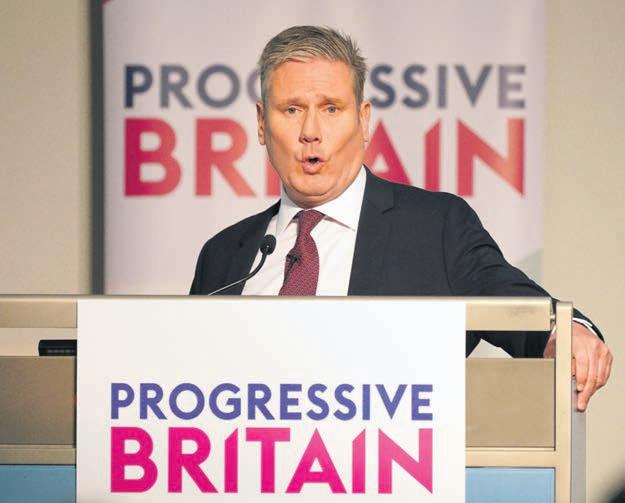

VODAFONE and BT will both update the market with their full year results this week, with the telecom giants looking to drastically improve their performances.
BT shares have had a great run since January. The reasons behind 2023’s storming run are not easy to find, says AJ Bell’s Russ Mould, although bid speculation could still be one of them.
But shares are still down by around a tenth over the past year.
“Take a long-term look it… BT’s shares are trading no higher now than they did in 1985, in the first year of the firm’s privatisation under the Thatcher government,” Mould said.

We’ll get a clearer picture of its health when its announces its full year results on Thursday.




Meanwhile at Vodafone, investors will be hoping new CEO Margherita Della Valle will offer a fresh start for the struggling telecoms company when it reports its full year results tomorrow.
As well as digesting her future vision for the firm, investors will be listening out for M&A noises around ongoing

talks to merge Vodafone’s UK business with Three UK.



After a dismal result for Asos last week – which reported a loss of £87.4m in the six months to the end of February, compared to a profit of £14.8m in the same period last year – attention now turns to rival Boohoo.
Boohoo reports full-year figures tomorrow, and the outcome could be similar. As online clothing sales drop amid a cost of living crisis and fast fashion retailers incur higher costs from increased returns, investors will be watching results closely.

The picture looks set to be very different for Burberry, however. The return of wealthy shoppers in China, free to spend as the country reopens from intense lockdown measures, look set to lift the company this week.
LVMH, the world’s largest luxury company, which owns brands such as Louis Vuitton and Tiffany, recently reported a 17 per cent rise in first quarter sales thanks to strong demand in China and the greater resilience of its wealthier customers to squeezed budgets.
Burberry will be hoping for more of the same.


The firm said last week that it continues to expect 2023 operating profits to be broadly in line with 2022. Analysts at Peel Hunt said its shares have performed well –up 16 per cent YTD. It held its ‘buy’ rating and target price of 450p.




FULL “The first three months of this year have seen the economy perform much better than even the most optimistic of forecasts, leaving lots of egg on the faces of those who were predicting all manner of disasters during the twilight weeks of last year... That’s not to say the UK economy doesn’t have its challenges, with the current government seemingly intent on strapping a ball and chain around its ankle with higher taxes and incoherent economic policies.”
MICHAEL HEWSON, CMC MARKETSAsos posted a huge loss last week. Despite enacting cost savings and margin initiatives, Analysts at Peel Hunt said there still uncertainty around future growth. It maintained its ‘hold’ rating but reduced its share target price from 750p to 550p.
Commons, she is attempting, almost casually, to delegitimise the unelected House of Lords and present it as an undemocratic obstacle to her proposals.
IN 1910, the United Kingdom went to the polls with the Liberal government campaigning under the slogan of “The peers vs the people” as they sought to pass Lloyd George’s radical Budget. When his proposals were rejected by the House of Lords, the government appealed over their heads to the electorate. Keep this precedent in mind.
Last week, the current government’s legislation on immigration endured a stormy time in the House of Lords. The Illegal Migration Bill would allow those who arrive in the UK illegally to be removed, either to their country of origin, or to an approved third country such as Rwanda. It’s explicitly designed to stop the illicit flotillas of “small boats” which are bringing ever-increasing numbers of hopeful immigrants across the English Channel.
The home secretary, Suella Braverman, admits freely - almost gleefullythat the bill will push “the boundaries of international law”, but the prime minister has called it “tough, fair and necessary”. Conversely, the UN Refugee Agency has called it “a clear breach of the Refugee Convention”, and respected legal commentator Joshua Rozenberg has warned it could contravene the European Convention on Human Rights.


Former senior police officer Lord Paddick of the Liberal Democrats told the

 Chris Hayward
Chris Hayward
JUST recently, ambassadors from across the EU’s 27 member states hailed the strong and strengthening relationship between the UK and the EU. This is in stark contrast to the situation just one year ago, when the EU was initiating legal proceedings against the UK.
Russia’s invasion of Ukraine last year brought into focus just how many interests and values we have in common with our EU allies. A new approach by the government to negotiations with the EU on Northern Ireland has also helped remove the major stumbling block in our relationship, replacing a source of protracted dispute with an agreement which both sides see as an improvement.
The Windsor Framework was warmly welcomed in the City for this reason. With this resolution, there is
Lords that the bill would “undermine the rule of law”. The archbishop of Canterbury, Justin Welby, argued it was “morally unacceptable and politically impractical”. Even the King is supposed to have described it privately as “appalling”. Paddick tabled a “reasoned amendment” to reject the bill: although it was defeated by 179 to 76, this is serious stuff. A government bill has not been lost at its second reading in either House since 1986, and not in the Lords since the late 1940s. The nuclear button is primed, if not yet pressed.
The bill will probably encounter stiff resistance as the House of Lords considers it in detail. Committee stage is not
time-limited in the second chamber, and the government anticipates genteel but determined trench warfare. To pre-empt this, Braverman has invoked the spirit of 1910. She has warned the Lords not to frustrate “the will of the British people” and reminded them that the legislation was a “manifesto commitment in 2019”. Her intention is as obvious: to set up another struggle between “the Peers and the People”. This attempt to put the House of Lords at loggerheads with the electorate is reckless, high-handed and constitutionally ignorant. The only obligation on the Lords, under the Salisbury Convention developed after the
Second World War, is not to stop or unduly delay the passage of legislation which fulfils a manifesto promise made by the government. Even if the Illegal Migration Bill falls into this categorywhich requires an imaginative reading of the 2019 manifesto - the House of Lords has every right to seek to amend the draft text and to do so at a reasonable pace. The current parliamentary session will run until the autumn, so there is no hurry yet.
But Braverman is hinting at a more sinister intention. By invoking the supposed approval of the British people and underlining the fact that the bill was passed by the elected House of
an opportunity for UK financial services to once again engage productively with our partners in the EU for the benefit of both our economies.
It’s an opportunity we must seize. Working together on sustainable finance in particular is essential for all of us, given the shared environmental and energy security challenges which we face. This is top of the agenda on my visit to Luxembourg this week, where I am discussing green finance solutions with the Luxembourg Sustainable Finance Initiative. Tackling the climate challenge will be at the top of the agenda when I meet representatives from government, regulators and the central bank.
Both sides need to build on the progress made so far. I wholeheart-
edly agree with the House of Lords European Affairs Committee's recent call to see this as a reset in UK-EU relations and look at improvements to the relationship across the board.
From the City’s perspective, we can approach this reset in a spirit of confidence, as London remains Europe’s leading financial centre and has much to offer – something which is appreciated by many of our European counterparts. Our global financial centre benefits Europe as a whole, supporting businesses and consumers across the continent.
We urge both governments to get on with signing the Memorandum of Understanding (MOU) agreed two years ago. This will enable the UK and EU to establish an ambitious bilateral financial services dialogue. Such a dialogue
will pave the way for strengthening supervisory cooperation through data sharing and electronic reporting and crucially, collaboration in financing the green transition. This will take time and won’t remove all issues overnight, but it will get us out of a state of limbo, putting us on the right track.
One other critical issue is whether London’s clearing houses will continue to serve customers in the bloc. In 2020 the London Stock Exchange’s clearing house handled more than 90 per cent of interest-rate derivatives, denominated in euros. These interestrate swaps are widely used by businesses to protect themselves against unexpected changes in borrowing costs. The current arrangement is expected to end in 2025; an extension
That is not how things work. Every part of the parliamentary process is valid and the second chamber is designed to scrutinise legislation and amend where necessary. To suggest that a specific measure somehow represents the will of the people - and should therefore be expedited - is dangerous. It risks shortening even further the brisk journey from hastily conceived headline to statute book. It’s also unclear whether the government has the support of the electorate for these precise measures: opposition to immigration has been falling in recent years, and the public’s confidence in any measures to control numbers is low.
We live in a representative democracy, not one which uses a phone-in public vote. The legislative process is a reflection of public opinion, but also of the considered views of parliamentarians. Trying to short-circuit the system denies legitimate scrutiny and makes bad laws.
The home secretary may still be high on the crudely populist fumes which thrust her into the political front line less than a year ago, but she has no special insight into voters’ minds, and no authority to try to menace Parliament. She would do well to reflect on the scalps of her predecessors - Amber Rudd, Kenneth Clarke, David Blunkettwhich have already been claimed by dealings with the immigration system, and consider a more conciliatory stance, however uneasily it sits with her nature.
£ Eliot Wilson is co-founder of Pivot Point and a columnist at City A.M.
would be a win-win for both sides.
But we can go further than the memorandum of understanding. The EU-UK Trade and Cooperation Agreement (TCA) leaves the issue of financial services to the MOU to cover. When the TCA comes up for its fiveyear review in 2026, the City will be pushing for better coverage of financial and professional services in particular.
With our relationship with the EU thawing, we’re in a much better place than last year. The renegotiation of the Switzerland trade deal is evidence of that. This new deal will strengthen our services trade relationship with a huge market whose bilateral trade is worth over £35bn annually to us. An enhanced trade agreement should also address cross-cutting issues including mobility, data flows and digital trade.
Further improvements will take time, but UK financial services must press forward now while the momentum is there for even closer UK-EU cooperation. The City must speak up and help shape the future of our continent.
WE

[Britain badly needs a godfather of AI regulation, but we’ll never be able to afford him (or her), May 4]
Regulation for artificial intelligence is vital but very challenging to design, implement and enforce. The last few months have demonstrated just how fast-moving the technology is.
We already live in a world where it’s increasingly hard to know truth from fiction, with fake news and conspiracy theories rife in the social networks and websites that are a primary source of information for many.
As Steve Wozniak rightly pointed out, AI will only make this more challenging. One of the biggest risks of generative AI technologies is how wholly believable
they are, and yet how wrong they often turn out to be.
However, if individual countries enact regulations that stifle innovation, they run the risk of being left behind in the next industrial revolution.
It’s no exaggeration to say that AI represents a step change in how our world works and our place within it.
While current generative AI models are limited by the training data that they learn from, as these technologies develop, the dawn of artificial general intelligence (AGI) draws ever closer.
With this come questions about what it means to be sentient; something that has always defined our place in the world as humans.
What is needed is global agreement on AI regulation. Sadly, the world of today doesn’t seem to be well suited to providing this.
John Smith Veracode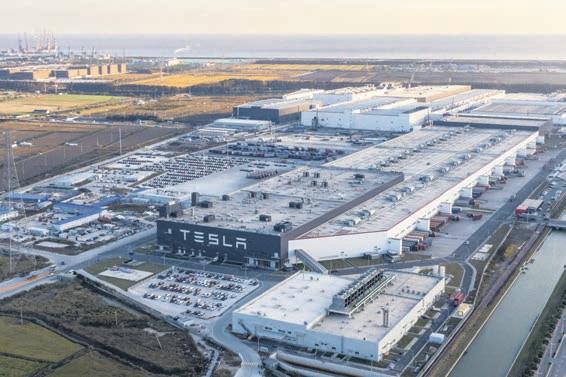
 Hamish Grierson
Hamish Grierson
LATE LAST week, the number of people waiting to start hospital treatment in England officially reached a record high. Cutting waiting lists is one of Rishi Sunak’s “five pledges” - and he clearly couldn’t be further from fulfilling it, with 10,737 people waiting more than 18 months to start treatment.
We know by now there is no silver bullet solution for the NHS crisis. But we’re not only failing to put out the fires in front of us; we’re also locking ourselves into decades more pain by failing to invest in the future.
Prevention is the best tool we have to address this health emergency. It means spotting the warning signs of disease early, helping to triage healthcare demand and reducing pressure on stretched services.
Take diabetes. It leads to more than 770 strokes and 590 heart attacks each week, but is largely preventable with the right diagnostics, monitoring, and self-management.
Self-monitoring of blood glucosewhereby people with diabetes measure their blood sugar themselves - has been demonstrated to improve HbA1c, your average blood sugar over the last three months.
Today marks the beginning of NatCon - a nerdy political conference you most likely have never heard of, but that could provide some hints on the unsettled future of the Conservative party. The conference, featuring Suella Braverman, Michael Gove and Jacob Rees-Mogg among its speakers, aims to centre minds on national conservatism. This strand of political thinking, as the name suggests, prioritises the national interest meant in a strong insular fashion. It also centres on embracing
conservative social values. The conference’s website describes national conservatism as the “best path forward for a democratic world confronted by a rising China abroad and a powerful new Marxism at home”. Panels include “national identity and culture” and “the economics of national belonging”. This get-together could offer a glimpse of what the party could look like postgeneral election, so whether you like the vibe or not, it’s smarter to look in than look away.
A randomised control trial showed that a reduction of just 0.92 per cent of this blood sugar in insulin-treated type 2 diabetes patients was associated with a 2.3 per cent decreased 10-year risk for a fatal heart attack. This, in combination with a 10 per cent reduction of low blood sugar incidents, led to cost savings of around £4.5m a year for type-2 diabetics.
Many of the solutions are already at our fingertips, from lab capacity to diagnostics infrastructure. On top of that, we’re becoming an increasingly health literate population. It’s partially a positive legacy from the pandemic, where collaboration knocked down the walls between the public and private sectors.
So many of the rehashed arguments about the private sector and technology in healthcare miss the point. We already have a system where the richest can pay for self-funded medical procedures and health interventions. The question we need to be asking is why shouldn’t everyone have access to this care?
The NHS already commissions a
whole host of companies to deliver services on its behalf. But we’re not focusing enough on the technology that can deliver the best return on investment in terms of preventing chronic disease.
Improving screening and prevention amongst people at risk of cardiovascular disease by as little as 10 per cent could help prevent 7 per cent of cardiovascular events, saving £2.4bn a year. Screening an additional 20 million people using at-home cholesterol panel tests would cost £200m, saving billions in the process. Home-run tests also ensure we’re able to target the people in the higher risk demographics, generally linked to a lower socioeconomic status and to less accessibility to healthcare clinics or centres.
Redistributing spending to focus on preventive healthcare would ultimately reduce pressure on the NHS and its hospitals and save us money,
paying for itself. Imagine getting the results of diagnostic tests on our phones, followed up by personalised information and advice about how to make relevant lifestyle changes to improve our health. A part of this is also equipping people with information of where to go - pharmacists play an important role here, not just GPs - if something acute requires attention.
Personalised data-driven insights are the basis of pretty much every service we engage with; it’s striking they’re not at the basis of health services too. Working on prevention would have a positive ripple effect throughout the whole NHS ecosystem, making life easier for overworked doctors and GPs, and ultimately freeing up space in hospitals for people who need to be seen. It’s a path forward we must seriously try.
£ Hamish Grierson is the founder and chief executive officer of Thriva

The renovation of one of Pula’s grandest hotels means now’s the time to visit, says Karen Harvey

Croatia is a relatively new country still finding its feet, but let me tell you, it has more to offer than just the sunshine we all expect. Having broken away from the former Yugoslavia and its communist rule in the nineties, the nation is thirty years into independence and as you’ve probably heard, is developing its own identity as an exciting, burgeoning holiday hotspot. Previously a centre for fishing and shipbuilding, the city of Pula is more than just a gateway to the Croatian coastline - it has grown into a city with a sense of freedom.
The old cranes on the docks no longer lug steel about like they used to. Instead they come to life at night with bright neon lights, a sign of how the city is transforming its industrial history and turning it to modern use. Near the cranes, the bars are bustling. I visited the city recently to take in the classic Austrian and Italian architecture but was really here to see why the city is so buzzy in 2023. I was headed to Wine City, a fortnight-long celebration of the best of Croatian wines. It was all fairy lights and great wine in incredibly plush glasses. A Croatia I can get on board with. But you needn’t visit for the event to find brilliant wine bars, which are dotted throughout the city, lending an atmosphere of somewhere like Barcelona (but without the pick-pockets!). The friendly locals stay out way into the night, topping off the evening with a shot or two of Grappa, a brandy-like drink often flavoured with local honey.
We must soak in the history too.
Pula’s famous Roman Amphitheatre, a great bowl of a thing that hosts cultural events all year round from the annual Film Festival to the opening nights of music festivals. It’s well worth the visit whether there’s an event on or not; I’d thoroughly recommend leaving a good couple of hours to laze around on the grass and stare up at the majesty of the building, perhaps with a little drink in hand. It’s the sixth largest amphitheatre in the world and back in the gladiator days it held 23,000 people (and a bunch of lions and panthers and when I closed my eyes, I could imagine the carnage that it must have been).
Pula was always a Yugoslavian hot spot for the rich and famous, and particularly popped off in the 1970s, due to the popularity of the communist President Tito whose dictatorship allowed him an excessively luxurious lifestyle, and attracted guests from Hollywood’s silver screen. The recent £2 million refurbishment of the Grand Hotel Brioni has returned one of the city’s historical hotspots to its former glory. Jutting out from the rocks above the Adriatic Sea, the hotel is still a destination for A-list guests, although the hotel has a ‘no tell’ policy when I ask who’s been in lately. While we were staying, so too was the current President of Croatia (not a dictator!), who must, I assume, prefer this hotel


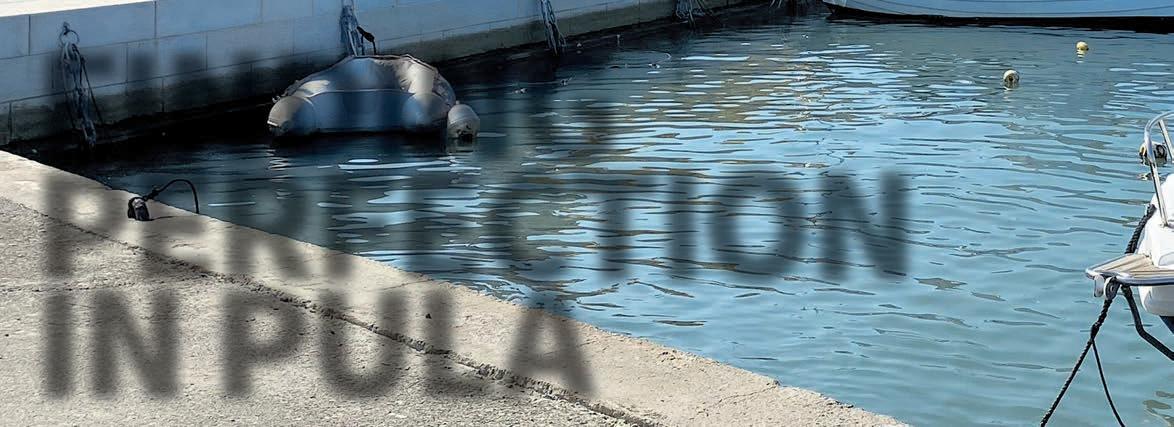



to his own home. Hotels often purport to be ‘homely,’ but the president choosing it over his own place is pretty great validation for the team, I’d imagine.
The hotel is every bit as pretty and ornate as you’d imagine. You can recognise the building’s modernist past in its bold and angular structure, but the kitsch and communist interiors of the old era are long gone, replaced by tranquil and open spaces, furnished in marble and velvet, with paintings and sculptures specially commissioned from Croatian artists.
The hotel offers a sizeable wellness centre, with an indoor pool and jacuzzi, saunas, a steam room, and something called a ‘Water Paradise’ shower which was so decadent I felt
like I had progressed through the five stages of evolution in twenty minutes. If you want to swim in the sea or lie by the pool with a cocktail, that’s thoroughly recommended, as the beach is stunning, but leave time to enjoy an evening on the terrace, watching the dolphins play as the hot sun sets over the sea.
I sipped a Zacapa Mojito, which is a twist on the classic, but did I mention the food? Croatia has wonderful local ingredients: truffles, olive oil, wine, and honey, along with the fresh seafood, naturally. The extra virgin olive oil is like nothing I’ve ever tasted – a peppery hit in the back of the throat, strong and rich, and apparently suggested (for the health benefits) as the first thing you con-
Dinner in the Sophia Restaurant, named after Sophia Loren, a guest from the 1970s heyday, is a great way to try local produce
sume in the day.
Head to Chiavalon Farm to get the inside intel on Istrian olive oil. We sat by the mill, amongst the groves, pushing and pulling the olive oil through our teeth in the most attractive manner (I lie, it was ugly, but it was a necessary motion). We learnt how to spot the true extra virgin oil from its lesser counterparts (for a start, there isn’t a cheap plastic bottle in sight.) Another exemplary Istrian producer to visit is Medea Winery in the town of Vodnjan near Pula, where the enthusiastic team make some of the best wines in Croatia. The grapes for their Montiron wine are picked and processed by hand, then the wine is aged in oak. For those who favour a red wine, the exceptional and award-
winning Punta Greca is produced in limited quantities from Istria’s southernmost vineyard on the Cape Punta Grkova.

Dinner in one of the hotel’s restaurants is a great opportunity to try the best of local produce. In Sophia Restaurant, (named after Sophia Loren, a previous guest from the 1970s heydays) smoke filled glass cloches revealed beef tartare enriched with foie gras, truffle and caviar.
Plates are presented piled with tomahawk steak and Kobe beef from the Josper grill, fermented honey shallots and a delicious Red Beer sauce.
If you’re more into seafood and pasta, head to Brioni Lungo Mare, one of the best spots, but make sure to leave room for the hotel’s extensive breakfast buffet

Experience the newly opened Grand Hotel Brioni Pula, a Radisson Collection Hotel, from £340 per night for a Premium Garden View Room, or £375 for a Premium Sea View Room. For business workers the hotel has a significant business wing, with bookable meeting rooms for teams sized between 10-16 people. Larger

spaces are available for up to 50 people. A pine forest and a selection of Mediterranean shrubs are viewable from every meeting room, which the hotel
considers a big perk for corporate groups.
“Greenery and nature are effective in increasing a person’s focus and this is the next best thing to having conferences in nature,” says the website. For more information and to book visit grandhotelbrioni.com.
in the morning. There’s much else to see near the city centre: the old fishing village of Fazana has boats headed for Brijuni Island. Cloaked in huge dark evergreen Holme Oak trees, the island was former President Tito’s summer residence. A communist leader for 30 years from the end of the second world war until his death in 1980, Tito used to drive around the island in his Cadillac Eldorado from his grand house to his zoo, past his Shetland Ponies (a gift from Queen Elizabeth II) as he smoked cigars in his smart suits and entertained government leaders and film stars.
Back into the 21st century at the Grand Hotel’s pool, I’d done quite enough learning. I wanted to sink into the clichéd Croatian thing of utter, total relaxation. Why not, I’d earned it.

AN EARTHQUAKE hit the world of professional wrestling earlier this month and its epicentre was London. All Elite Wrestling, formed to compete with the all-conquering World Wrestling Entertainment, released tickets for its first ever UK shows, at Wembley Stadium, and sold 60,000.
“All In London is becoming one of the greatest success stories in wrestling history,” said AEW’s CEO Tony Khan, also a key executive at Fulham Football Club. “We wanted our debut in London to be epic in every way and we’re already breaking records. This is all before announcing a single match.”
What makes this success more remarkable is that AEW did not have a clear run at the London market; WWE will be running its own supershows here in July, its biggest in the UK for more than 30 years.

Veteran WWE performer and executive Paul Heyman placed these shows in context: “Fans have been clamouring for another major WWE premium live event in London since SummerSlam 1992. They are now getting that with WWE Money in The Bank from The O2 this July. Due to the overwhelming demand, we even saw the addition of SmackDown the night before – set to be broadcast live from London for the very first time.”
In referencing SummerSlam 1992, Heyman evoked the last time that the eyes of the professional wrestling world were on London. That event was part of a resurgence of combat sports running major stadiums that lasted for around a decade, starting with Frank Bruno trying to win a world title at Wembley Stadium in 1986.

This summer’s shows, however, are part of the new wave of big fights in football stadiums that began when Eddie Hearn brought boxing to the new Wembley Stadium with the 2014 rematch between Carl Froch and George Groves. What seemed like a crazed gamble, given Froch’s previous struggles in drawing outside Nottingham, proved a roaring success, with

more than 80,000 watching the veteran knock out the young pretender. Hearn would build on this success, with Anthony Joshua’s reign as heavyweight champion being defined by his repeated appearances in front of gigantic crowds across London.
Ironically, the reason why boxing surged ahead in the booking of blockbuster live events was that it better monetises its British television audience by persuading bars and households to buy fights on Sky or BT’s sports box office channels. This means that promoters don’t have to worry that whatever they gain from a larger attendance here would be more than lost in fewer Americans paying to watch the fights on television.
That concern about US viewers is why until March, when Leon Edwards successfully defended his welterweight title, the Ultimate Fighting Championship had not held a single title fight in London since 2007 despite the quick sell-outs and large gates they frequently secured at The O2. But with premium live events increasingly

being made available as part of streaming services, promotions are no longer so bound to American schedules.
“The world has changed. The way fans choose to consume their content has changed,” Heyman added. “Now it is easier than ever for anyone to watch their favourite WWE superstars in a marquee match on a marquee show, totally live, no matter the time zone.”
It is speculated that AEW’s London debut might be broadcast on their American broadcast partner Warner Bros Discovery’s MAX streaming service, with a more traditional pay-perview event being broadcast from America the following week.
Likewise, the UFC is coming back to London after only four months away, for an event that will be shown in
Given the UFC and WWE can so easily sell out The O2, why don’t they try to run one of the many larger venues in the city? A key reason is that these promotions, which are in the process of merging, look to have either venues or local governments pay them for bringing a major show to the area.
WWE successfully ran a huge stadium show in Cardiff last year, which secured a subsidy from the Welsh government. Although Wales said the event generated £22m for its economy, it’s difficult to envisage London following that path, given how packed its events calendar already is.
And that left the field open to the upstart – much to their own performers’ surprise. “I thought they had gotten it
confused with Wembley Arena, which in its own right has hosted great professional wrestling shows,” said British star Jamie Hayter, AEW’s women’s champion. “But nope, it’s the stadium. I was gobsmacked. I was elated. I was nervous.”

British promoter Andy Quildan, who helped train Hayter and whose Revolution Pro Wrestling promotion runs shows in London, is hoping to capitalise by staging his biggest yet at the Copper Box Arena.
“I think it’s a unique opportunity because you’re going to have thousands and thousands of wrestling fans in town,” he said. The efforts of Quildan and other local promoters promises
that British fans will finally get the type of weekend-long fringe festival of wrestling that is an annual occurrence in America.
As a veteran of that local scene, Hayter is struggling to comprehend the size of the crowd that will be gathered for what Khan described as a “homecoming” for her and other AEW talent from Britain.

“The last time I wrestled in the UK was in front of about 200 people, if that,” she added. “The UK fans are known for how loud, proud, and electric they make any arena. So that’s going to be an experience.”
The unique energy that comes from British fans is also cited by Heyman: “There’s a certain level of prestige, of cachet, in the phrase ‘Live from London’. WWE has always been very aware of that. London is not only a key market when it comes to the corporate side of business. Something very special happens when WWE comes to the UK.”
Between Money In The Bank and All In London, professional wrestling is doing its bit to ensure London punches above its weight once again as a worldleading host of combat sports.
WWE returns to London in July. Visit www.theo2.co.uk/events/detail/wwemoney-in-the-bank.
AEW debuts in London in August. Visit www.wembleystadium.com/events/2023/A EW-All-In-London-at-Wembley-Stadium

Why boxing, MMA and now wrestling have made the city a combat sports capital again. By Will Cooling
There is a certain prestige, of cachet, in the phrase ‘Live from London’.
WWE is very aware of that
Why the city has become a combat sports capital PAGE 19
SAM Kerr scored the decisive goal as Chelsea beat Manchester United 1-0 yesterday at Wembley Stadium to win the Women’s FA Cup –their third in succession.
A world record 77,390 crowd for a women’s domestic club match watched on as pre-match favourites Chelsea took on Women’s Super League leaders Manchester United at the home of English football.
The match was finely poised throughout the opening 45 minutes, with the two sides heading to the changing rooms level at 0-0.
But the match was won by Kerr, who has scored six goals in the Women’s FA Cup this season, in the 68th minute.
The Australia international got on the end of a cross provided by Denmark’s Pernille Harder and netted from close range to hand Chelsea the cup.

The trophy is Chelsea’s third FA Cup in a row and fifth in total –it is also the Blues’ 12th competitive league or cup trophy in their history.
“What I love about Sam is that she’s willing to take responsibility,” Chelsea manager Emma Hayes said. “But it is important to mention Pernille Harder because without her she wouldn’t have got that goal.”
ARSENAL manager Mikel Arteta criticised his team after their Premier League title challenge suffered a knockout blow in a 3-0 home defeat by Brighton yesterday.
Second-half goals from Julio Enciso, Deniz Undav and Pervis Estupinan stunned the Gunners and left them with only the slimmest of mathematical chances of catching Manchester City.

City earlier tightened their grip on

top spot – and a fifth title in six years – with a 3-0 win at Everton which put them four points clear with three games left to Arsenal’s two.
“I was stood here and very proud of what we did last week [at Newcastle] but today we have to apologise because the performance in the second half was not acceptable,” said Arteta.
“Mathematically it is still possible and this is football but today it is impossible to be thinking about it. We have to face the result, the performance in the second half and
MATT HARDY
SALE Sharks reached their first Premiership final since 2006 yesterday with a 21-13 win over defending champions Leicester Tigers at the AJ Bell Stadium.
In front of a capacity crowd of 12,000 on the outskirts of Manchester, Jimmy Gopperth, 39, put the visitors 6-0 ahead with two early penalties before man of the match George Ford converted Tom Roebuck’s try to hand Sale a 7-6 lead at half-time.

Leicester winger Harry Potter and Sale’s Aaron Reed exchanged tries in the second forty –with Gopperth
converting Potter’s score –but three successful Ford penalties put the game to bed for Sale.
Their reward is a trip to Twickenham in a fortnight’s time to take on Saracens, who beat Northampton Saints 38-15 on Saturday.
Sale have not won the English domestic title since 2006.

“They [the team] had to wear a lot of bruises,” said current Sale and former Saracens head coach Alex Sanderson after the win.
“We knew that was going to be the case. I couldn’t be more proud of them and they showed a bit of maturity today.”
understand why, and obviously have a very different reaction the next game.”
City can clinch the title before playing Chelsea next weekend if Arsenal fail to win at Nottingham Forest on Saturday. To pull off a miraculous comeback, Arsenal would need to win their games against Forest and Wolves and hope that City took just one point from their remaining fixtures. But that would require an improbable collapse from Pep Guardiola’s men, who have taken 40 points from a possible 42 since losing to Tottenham in February.
Both teams threatened in a nip and tuck first half at Emirates Stadium but Brighton took charge with a superb
display after the break to climb into the Europa League qualifying places.
Enciso nodded the visitors in front after Arsenal failed to clear and as the hosts chased the game they punished them with late breakaway goals from Undav and Estupinan.
City made light work of a potentially tricky fixture against relegation-battling Everton. Ilkay Gundogan, cleverly flicked the opening goal before crossing for Erling Haaland to head his 52nd of the season and then completed the scoring with a free-kick.
Brentford climbed to ninth with a 2-0 win over West Ham earned by goals from Bryan Mbeumo and Yoane Wissa.
BASKETBALL
Hayes went on to say that it would “bug” her if she did not acknowledge the difficult season endured by Chelsea.
“The men’s team has not been brilliant,” she said. “[So] Chelsea fans, this is for you.”
The crowd set a new record for a domestic women’s club match –internationals and Champions League ties have surpassed the 77,390 figure.
For Manchester United there is still hope of winning the Women’s Super League and claiming their first ever top flight trophy. Marc Skinner’s side lead Chelsea by one point having played one extra game.
MATT HARDY
THE London Lions completed the domestic basketball double double after both the men’s and women’s teams beat the Leicester Riders in the play-off finals at the O2 Arena.
The women backed up their 95-42 BBL Cup victory with a 57-41 win over the Riders in the opening match of the play-off on Sunday in South London, which attracted a crowd of more than 15,000.
The men followed up their 79-71 cup success with a 88-80 victory in the second play-off of the day to get revenge over the side who beat them at the same stage last season. It was the first
ever play-off championship victory for the London Lions, who won the league with a record breaking number of games to spare and concluded the season 14 points clear of the Riders in the table.
“We get into it on the court, we get into it off the court but really we’re like brothers,” MVP Jordan Taylor said. “Ryan [Schmidt, coach] tells us every day how proud he is of us. What we’re building is special and I am happy to be part of it.”
The Lions also became the first ever UK team to reach the EuroCup playoffs but lost to Club Joventut Badalona.
They are set to feature in the next edition of the continental competition.